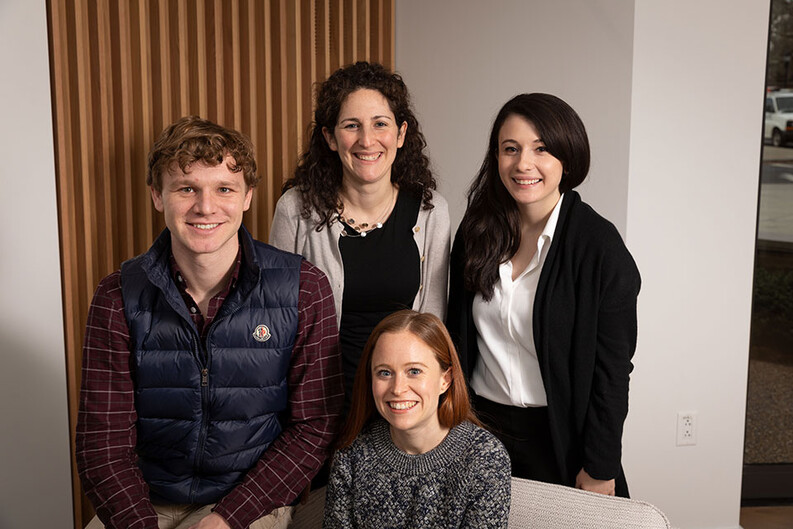SFALP Clinic Takes the Fight Beyond the Courtroom

For more than a decade, students in the San Francisco Affirmative Litigation Project (SFALP) have worked side-by-side with the San Francisco City Attorney’s Office (SFCAO) to fight injustices in court, racking up a series of high-profile victories such as a nationwide injunction against the President’s sanctuary city order and a billion-dollar settlement in a case against the lead paint industry.
In the past year, the Clinic has expanded its practice to include helping the City Attorney’s Office draft public comments, with the goal of challenging problematic proposed federal regulations before they become law.
“In our affirmative litigation cases against the federal government, we’re suing after a policy has already been finalized,” explained Emma Sokoloff-Rubin ’18, who as a student worked on the sanctuary cities case and now helps lead the clinic as the San Francisco Affirmative Litigation Project Fellow. “Through our public comment work, we’re able to engage directly in the federal rulemaking process. Ideally, these interventions influence proposed policies before they become law — and even when agencies aren’t receptive to our comments, the arguments we make bring awareness to the issue and pave the way for future litigation.”
As with its affirmative litigation, the clinic’s public comment work focuses on issues that directly affect San Francisco residents and also have broader implications around the country. Last semester, students worked on public comments challenging federal rules that would restrict access to food stamps, make it harder to file public housing discrimination complaints, increase fees for immigration applications, and allow the government to increase emission limits on methane and other harmful greenhouse gases.

Profound Consequences
“Public comments may seem arcane, but they can be vital parts of forceful campaigns for policy change that fuse litigation, advocacy, lobbying, and grassroots organizing,” explained Duncan Hosie ’21, who has worked on several public comments this academic year. “They provide a crucial feedback loop to agencies so that they can incorporate empirical data to ameliorate rules. They lay the groundwork for future litigation and legislation. The rulemaking process can mobilize various actors and disseminate key information to a whole array of groups.”
“Public comments may seem arcane, but they can be vital parts of forceful campaigns for policy change that fuse litigation, advocacy, lobbying, and grassroots organizing.”
—Duncan Hosie ’21
Shannon Manley ’20, who also worked on several of the comments, said that while it’s easy to get lost in the sea of proposed rules and changes between all the federal agencies, there is an important opportunity to protect the most vulnerable populations through this work. Drafting comments is a way for the City to weigh in on the many discriminatory rules federal agencies have proposed, and to make the rulemaking process itself more visible.
“Rules like these are proposed so frequently, and drafted in such esoteric terms, that they sometimes fly under the radar,” explained Manley. “But the consequences of these rules are profound. The rules I helped challenge would exacerbate problems like food insecurity, housing insecurity, and climate change.”
Melissa Fich ’21 saw the critical importance of the process when she worked to challenge a proposed rule by DHS aiming to increase fees for most immigration applications and eliminate certain fee waivers. The rule, she said, would create a serious burden for immigrants seeking a better life in the U.S.
“This proposed rule creates serious financial hurdles for thousands of individuals applying for key immigration benefits, including citizenship and renewal of immigration documents,” explained Fich. “This has far-reaching consequences for immigrants’ wage-earning possibilities, civic participation, and personal sense of security.”
From Rule to Lawsuit
The public comment work goes hand in hand with the City Attorney’s Office’s affirmative litigation against the Trump Administration. When the federal agency in question persists with finalizing its proposed rule despite challenges the City has raised in public comments, the City sometimes decides to file a lawsuit challenging the rule in court. For example, the SFCAO submitted a comment challenging the public charge rule, which drastically expands the reasons someone can be deemed a “public charge,” and thus denied entry into the U.S. or refused adjustment of their immigration status, including receiving a green card. When the rule was nonetheless finalized, SFALP students and their supervising attorneys filed a lawsuit challenging the rule in court. They did the same for the so-called conscience rule, which would allow health care professionals to refuse to provide service to patients based on the staffer’s personal beliefs, threatening medical access for women; lesbian, gay, bisexual, and transgender people; and other medically or socially vulnerable populations.
Kevin Yeh, Deputy City Attorney and co-supervisor of the public comment group, said SFALP students are playing a pivotal role in protecting the public interest through their work drafting public comments.
“The Trump Administration systematically and relentlessly attempts to undermine the rights and welfare of women, minorities, immigrants, and young people, whether by making it harder for people to access critical healthcare or by ignoring the threat of climate change,” Yeh said. “Through drafting and submitting comments voicing opposition to the Administration’s proposed regulations, SFALP students are taking an active role in protecting the public interest while developing skills that will be valuable to them as future lawyers.”
A Voice for the Voiceless
Through this work, students are also being given a prime opportunity to put theory into practice.
“To draft a strong comment, students need to identify what exactly makes a rule unlawful, and then articulate that in a succinct and compelling way,” said Sokoloff-Rubin. “That’s often harder than it sounds, because it requires looking beyond what might seem instinctively wrong or discriminatory about a rule and identifying the precise ways in which that rule violates existing legal frameworks.”
“Our work this semester enabled me to put lessons from the administrative law classroom into practice,” added Manley. “We not only tracked administrative actions but constructed our own legal grounds to challenge them.”
This work is also a powerful example of how the law can be used to give a voice to the voiceless and protect everyday Americans from detrimental rules that can harm their lives.
“I appreciated learning how to craft compelling legal analysis without forgetting or erasing the stories of people impacted by federal regulation,” said Hosie. “We learned how to navigate [the rulemaking] labyrinth while still elevating the voices of regular, vulnerable people, from immigrants to low-income Americans.”
“The impact of these rules will be felt by millions of people nationwide, adults and children alike,” added Manley. “When people will be harmed by a federal agency’s action, it’s important to speak up.”


